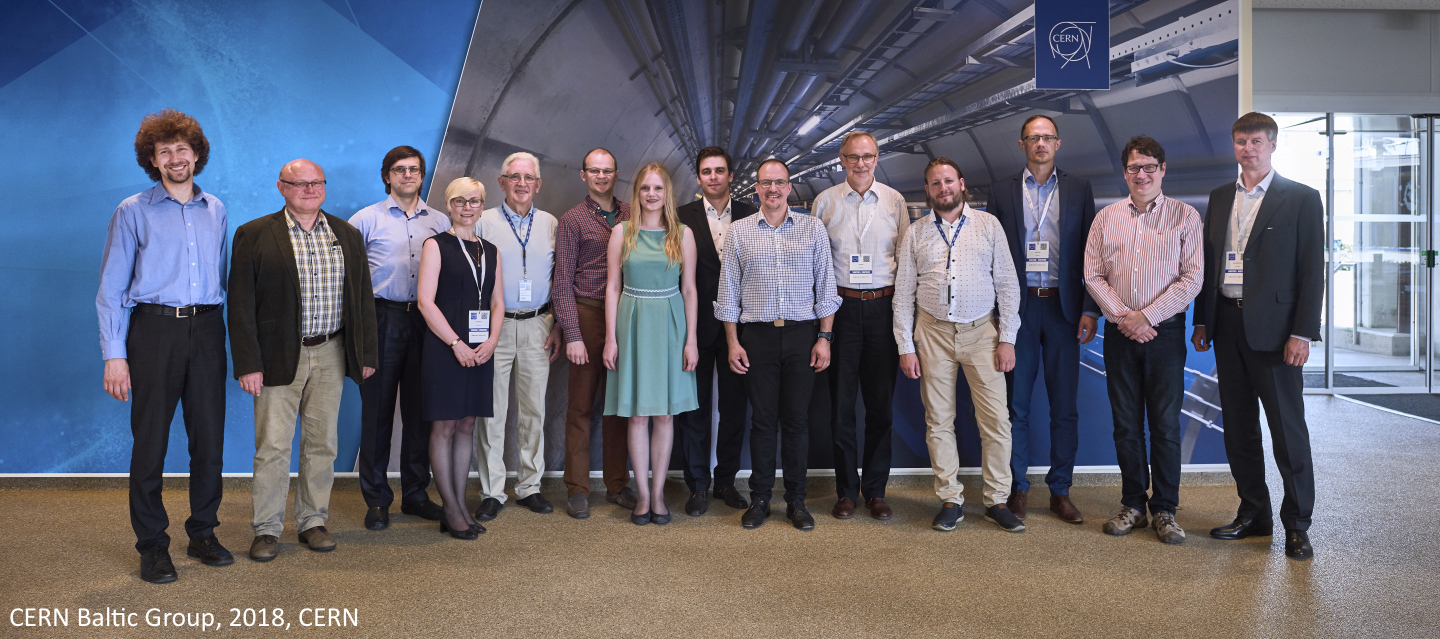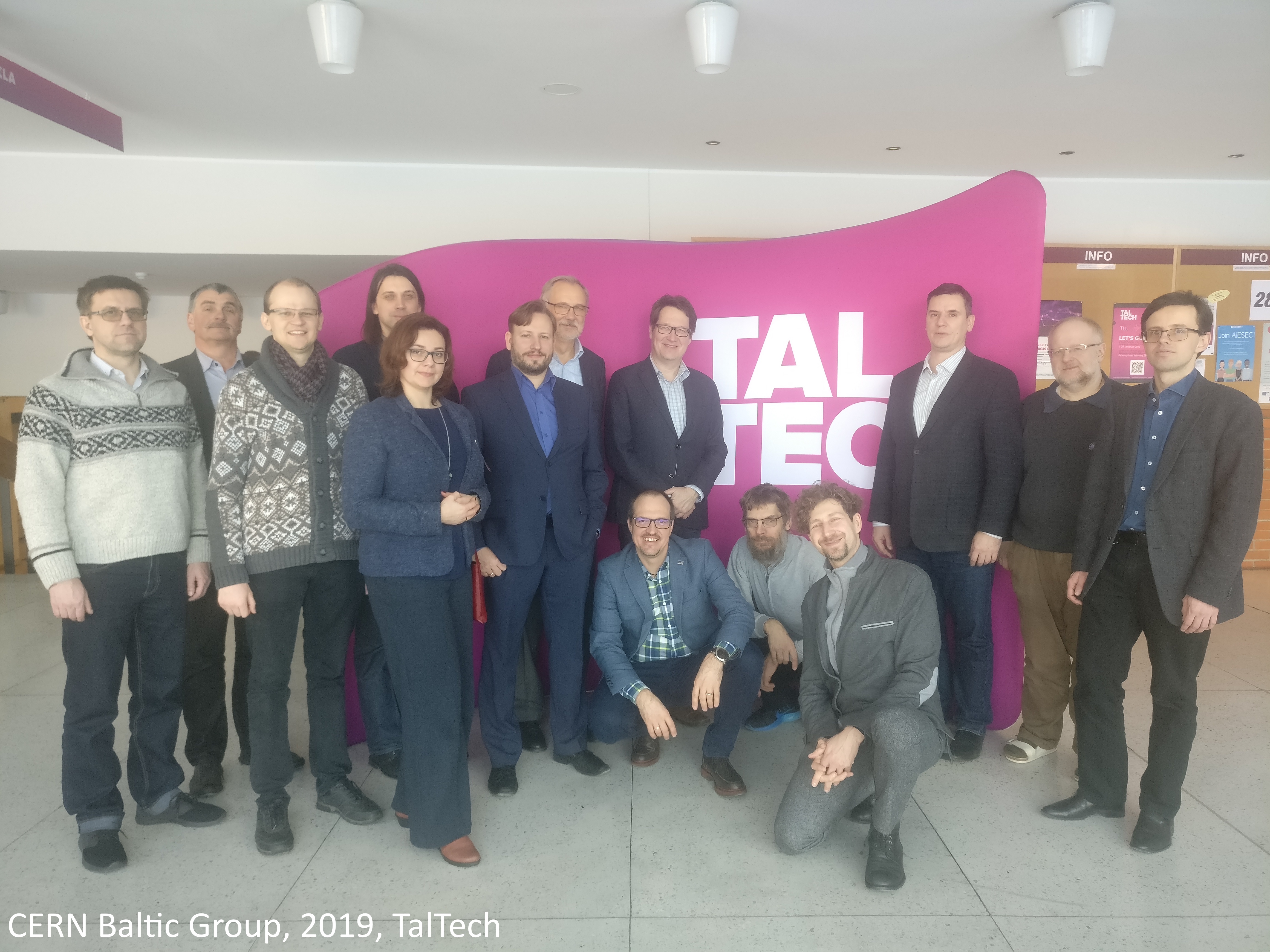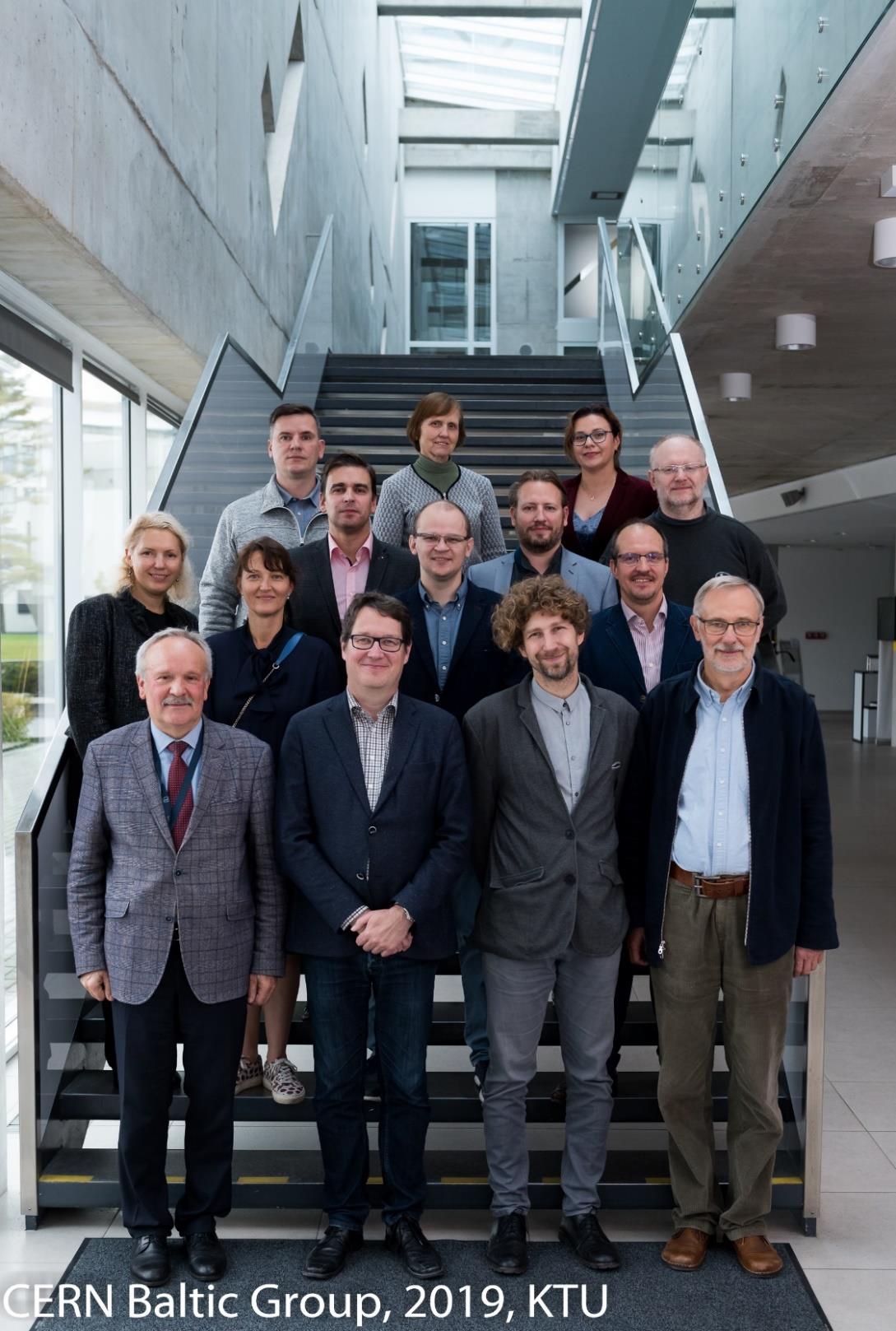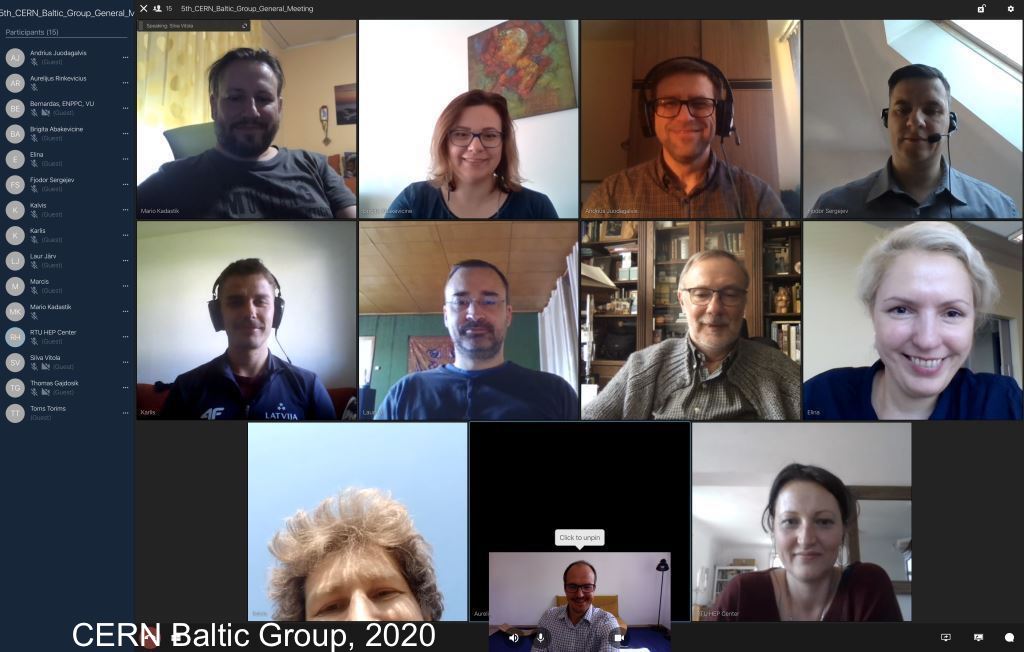The CERN Baltic Group (CBG) is a collaboration of Estonian, Latvian and Lithuanian higher education and research institutions involved in CERN-related activities. The first-ever meeting of the CBG took place on the 2nd of February 2018, and has since been followed by regular gatherings to coordinate the CERN-related activities in the Baltic countries
The CBG was officially founded on 28th of May 2018, when eight major universities of the Baltic States signed the Memorandum of Understanding at CERN. The CBG is a unique body and the first regional collaboration of its kind, where multiple institutes from multiple countries work together and coordinate their CERN-related activities in research and innovation within a legally defined framework.
There are three working groups in the CBG, each focusing on a certain aspect of CERN-related activities. These are the Study Programme Group, the CMS group and the Industry group. Their activities are organized by the CBG Coordination Team.
The main principles of the CERN Baltic Group are:
The CBG is headed by a Chairperson, assisted by a Deputy Chairperson. These posts are assigned in an election process, with each member institution having an equal vote. The elections are held every two years. The current Chairperson is Toms Torims (Riga Technical University, Latvia), with the Deputy Chairperson Mario Kadastik (National Institute of Chemical Physics and Biophysics, Estonia).
The main objectives of the CBG are:
«The establishment of the CERN Baltic Group is a strong signal to the CERN Council that the Baltic region universities will unite to coordinate their scientific work for joint participation at CERN experiments. Moreover, CERN Baltic group will cooperate with CERN not only at the scientific level but also at the political level, contributing to the transformation of Latvia and Estonia into full-fledged CERN member states,» says T. Torims.
Lithuania joined CERN as an Associate Member on January 2018, Estonia on February 2021, whilst Latvia is closing in on the goal of becoming Associate Member. In order to join CERN as full Member States, the Baltic countries need to further develop their research capacity in high-energy physics. This will be aided by the development of international masters’ and PhD level study programmes in particle physics and accelerator technology, which will enable physics students in the Baltic region to acquire the relevant expertise and skills to pursue a career in high-energy physics research in the future.
 Date: 2 February 2018
Date: 2 February 2018
Place: Riga Technical University
Chairperson: Toms Torims (Riga Technical University)
The opening meeting was held to introduce each of the Baltic States to CERN and present the collaborative spirit of the Baltic Group. The participants were six Baltic universities and two research institutes, among them also being CERN.
Juozas V. Vaitkus from Vilnius University representing Lithuania, which is already a CERN Associate Member, presented their involvement at CERN and their vision of a collaborative work between the Baltic States and CERN altogether.
Mario Kadastik from National Institute of Chemical Physics and Biophysics, being the representative of Estonia, accentuated on the relevant industries contribution to CERN and their path for joining CERN as a full member.
Toms Torims from Riga Technical University in Latvia elaborated on the global CERN vision, Latvia’s accession to CERN and the regional role of the Baltics.
The presentations were followed by discussions about an international inter-disciplinary particle physics and accelerators technology study programme, which is one of the major objectives for the CERN Baltic Group.
More information at https://indico.cern.ch/event/699147/
 Date: 28-29 May 2018
Date: 28-29 May 2018
Place: CERN
Chairperson: Toms Torims (Riga Technical University)
The second meeting of CERN Baltic Group (CBG) put together the leading head members of the CBG and Advisers for Relations with CERN in Geneva. This helped to build a relationship with CERN by showing the commune interest and capabilities of the CBG to CERN. The participants were six Baltic universities and two research institutes, among them CERN who hosted the meeting.
This time it brought more representatives from all the parties as the Memorandum of Understanding was signed between CBG and CERN on 28 May 2018.
On the first day, each country presented their current collaboration with CERN and advertised their universities and most relevant study programmes that could bring additional expertise to CERN and be as a foundation for the new joint study programme in high energy physics and particle accelerator technologies.
During discussions, CERN noted the long lasting cooperation with the Baltics since regaining of their independence in the 90s. It was emphasized that each country has found their own area of collaboration at CERN, but at the same time all working together at the CMS experiment, which has not been a rigidly coordinated process, but each country’s own initiative.
The joint study programme in the Baltics was also a topic of matter discussing the format of the whole study process, relevant courses, possible CERN involvement and the common goal of this study programme.
On the second day, while the study programme was still the leading topic CERN also presented the CERN Accelerator School with its content and further applications in R&D of the accelerator technologies. Since CMS is an ongoing major project at CERN, where all three Baltic States are involved in, review of the current and future collaboration was carried out including other related projects in the near future.
The meeting session was concluded with a summary of the accomplished and tasks to be done until the next meeting.
A CBG Coordination Team was elected with representatives from all the participating establishments:
Separate work groups were established to focus separately on each topic:
More information at https://indico.cern.ch/event/707741/
 Date: 29-30 January 2019
Date: 29-30 January 2019
Place: Tallinn University of Technology
Chairperson: Toms Torims (Riga Technical University)
In beginning of the meeting, all the members received an update about the news since the last meeting such as possible CERN Business Incubator in Vilnius and Kaunas, last task forces mandated by the CERN Council, proposal and the latest update about the joint study programme and the summer school. The participants were six universities, and two institutes among them also CERN.
The first day, all three member states presented their local ongoing research in the field and proposed ideas how to integrate scientists from the other member states to strengthen the CBG altogether. A CERN representative Christoph Schaefer summoned up the facts about CERN and CBG cooperation so far and pointed out possibilities at CERN that the group could take part in. Maurizio Vretenar, also a CERN representative, informed about the latest accelerator technology development projects within the ARIES project, under the European Commission's Horizon 2020 Research and Innovation programme.
Day one was closed with presentations by Mārcis Auziņš (University of Latvia) and Kalvis Kravalis (Riga Technical University) from the Study Programme Group sharing the plans for implementation of the new study programme “Particle Physics and Accelerator Technologies”.
The next day, Aurelijus Rinkevicius (Vilnius University) from the CMS Group reported the status of CBG involvement in the CMS experiment activities and the themes that the group is focusing at the moment.
Another topic that was discussed was CERN Baltic Group Internship Programme. The meeting participants agreed on terms of entry requirements, the content of the programme and expected outcome.
The meeting was also attended by Hans Peter Beck (Universitaet Bern) representing International Particle Physics Outreach Group (IPPOG), which is another opportunity for the local high energy physics and particle accelerator community to step up. These opportunities include international masterclasses, seminars and collaborative experiments connecting countries worldwide.
All attendees discussed the relevant support instruments to boost international cooperation like CMS TIER3 tool for schools, COST action, Erasmus+, industry engagement (ILO).
The session was closed with promoting Trans-European School of High Energy Physics (TES-HEP) by Toms Torims (Riga Technical University). TES-HEP also organizes summer schools and plans to host it in the Baltics in 2019, a separate discussion about that to be dedicated. This is another establishment for high energy physics and particle accelerator community where CERN is also a member.
More information at https://indico.cern.ch/event/781162/
 Date: 9-10 October 2019
Date: 9-10 October 2019
Place: Kaunas University of Technology
Chairperson: Toms Torims (Riga Technical University)
At the meeting, all the representatives of CBG received an update regarding the status of Baltic States vis-à-vis CERN, general information about CBG working groups and further objectives of the meeting. The participants were six universities and two institutes among them also CERN.
The first day started with a recap of the previous general meetings and the keynote of the proceeding listed by the Chairperson Toms Torims. The members were also invited to present their current state-of-play with CERN. Each work group informed about their progress to reach the declared goals.
The general meeting group collegially agreed on further actions regarding Latvia’s and Estonia’s accession to CERN. Additional CMS Group actions were clarified in terms of CMS Phase 2 Upgrade special attention paying to CMS Computing Network Tier II.
During the second day, The general group discussed the involvement of CBG in CERN organized projects like HITRI, PRISMAS-MAP, ARIES, HERTIS, AIDA++. Considerable time was spent on the CBG Industry group, which collectively agreed to coordinate CERN Industry Road Show in the spring of 2020 and Baltic Industry Days at CERN in 2021. Also, CERN Baltic Group Internship Programme and Accelerator School in Kaunas (KTU) in spring 2020 was a topic of matter.
Closing the session, the CBG Coordination Team was elected and confirmed to organize the work between the established work groups.
More information at https://indico.cern.ch/event/811370/
Date: 30 January 2020
Place: Videoconference
Chairperson: Toms Torims (Riga Technical University)
As every CBG general meeting it was commenced by updating all the participants with the latest updates this time outlining TIARA consortium and the potential benefits of the participation for the CBG at large and its members individually. Dr. Kārlis Dreimanis (Riga Technical Univeristy) updated on the status of both the organizational and financial aspects of the CERN Baltic Summer School and presented a poster for this event.
The Chairperson informed about the launch of a new CERN project called Science Gateway, which is going to be a scientific education and outreach center for the general public.
The representatives clarified the next steps to be taken for these matters. The meeting was attended by four universities and the National Institute of Chemical Physics and Biophysics.
More information at https://indico.cern.ch/event/878009/
 Date: 7 April 2020
Date: 7 April 2020
Place: Videoconference
Chairperson: Toms Torims (Riga Technical University)
Due to the restrictions imposed by the spread of Covid-19, the 5th General meeting of the CBG was held in a virtual format.
The general meeting was opened by Toms Torims summarizing discussions from the previous two meetings and the activities since then.
During this meeting, elections of the Chairman and Deputy Chairman took place, who are chosen among the Member representatives and elected by simple majority of the General Meeting for a term of two years. CBG re-elected Toms Torims (Riga Technical University, Latvia) as the Chairman and Mario Kadastik (National Institute of Chemical Physics and Biophysics, Estonia) as the Deputy Chairman.
Representatives from all three Baltic States (Mario Kadastik – Estonia; Toms Torims – Latvia; Aurelijus Rinkevičius – Lithuania) presented their current status at CERN through national engagement and involvement of the Baltics collectively. This also included discussions about local industry integration into CERN and CBG activities.
Plans for the Baltic School on High Energy Physics and Accelerator Technologies were discussed along with the developing study programme, its status of progress and objectives.
More information at https://indico.cern.ch/event/901922/
Date: 28 October 2019
Place: Videoconference
Chairperson: Toms Torims (Riga Technical University)
The first Coordination Team session presented the last status updates related to CMS, CERN Industry Road Show and COST Action application development for the Summer School project. The participants agreed to have a short meeting on a monthly basis to keep track of all the changes within the CBG and inform all the work groups and any other relevant parties with the latest updates.
More information at https://indico.cern.ch/event/858096/
Date: 26 November 2019
Place: Videoconference
Chairperson: Toms Torims (Riga Technical University)
The conference gives an overview of the status update on CMS related activities, development on the joint list of the industry representatives, CERN Industry Road Show and consideration of the COST Action application for the Summer School project. The participants were six universities and the National Institute of Chemical Physics and Biophysics.
More information at https://indico.cern.ch/event/863019/
Date: 10 December 2019
Place: Videoconference
Chairperson: Toms Torims (Riga Technical University)
First, the CMS computing network (Tier II) and mapping of CERN-relevant industries were discussed coming to a conclusion that there is a need for a mediator who would be well qualified in the field and could connect CBG work groups with establishments of interest. Organizational matters were discussed regarding CERN Industry Road Show in the Baltic Countries in spring 2020 and Baltic School on High Energy Physics and Accelerator Technologies in August 2020.
The meeting was participated by five universities and the National Institute of Chemical Physics and Biophysics.
More information at https://indico.cern.ch/event/869540/
Date: 10 February 2020
Place: Videoconference
Chairperson: Toms Torims (Riga Technical University)
A brief update of the ongoing processes was given by the Chairperson such as Latvia’s and Estonia’s accession to CERN, PRISMAS-MAP and I-FAST projects, and CMS week 2021.
There was also an invitation received from Upsala University in Sweden to attend a workshop “Prospects for Intensity Frontier Particle Physics with Compressed Pulses” on 2-3 March 2020. This could be used to discuss different possibilities for closer contacts between the Baltic and Nordic countries in Particle Physics Research.
More about the workshop https://indico.cern.ch/event/849674/
After the previous meeting it was emphasized that there shall be local share point contacts that would help the CBG acquire contacts from relevant industries and help them to integrate in CERN activities. For this Mario Kadastik will represent Estonia and Adomas Jelinskas – Lithuania. A few perspective companies have been noted down already.
Baltic School for High Energy Physics and Accelerator Technologies has been drafted for COST Action funding and takes place in the RTU campus Ronīši 10-14 August 2020. Five universities, the National Institute of Chemical Physics and Biophysics and Lithuanian Innovation Center were represented at this session.
More information at https://indico.cern.ch/event/887307/
Date: 11 March 2020
Place: Videoconference
Chairperson: Toms Torims (Riga Technical University)
The Chairperson opened the meeting announcing the Baltic Assembly’s support to CBG, which was gained after Toms Torims (RTU), Aurelius Rinkevicius (VU) and Christoph Schaefer (CERN) showed a presentation at the Baltic Assembly on 31 January 2020. The Baltic Assembly expressed their willingness for CERN to establish an internship programme for Baltic students at CERN.
The progress in PRISMAS-MAP, I-FAST and CMS computing network Tier II was discussed. The first CERN Baltic School lecturers were announced and the status of the joint study programme was reviewed.
The meeting consisted of representatives from four universities.
More information at https://indico.cern.ch/event/895835/
Date: 11 May 2020
Place: Videoconference
During this short meeting, 7 participants representing 5 institutions met and discussed the latest in CERN Baltic Group.
An important topic was the CBG activities in the global fight against COVID-19 and relevant industry sourcing. The group was introduced to the study fee system for the CERN Baltic School. The ongoing activities in development of the joint study programme were discussed.
More information at https://indico.cern.ch/event/917017/
Date: 3 July 2020
Place: Videoconference
Chairperson: Toms Torims (Riga Technical University)
During this short meeting, 10 participants representing 6 institutions met and discussed the latest in CERN Baltic Group.
Group congratulated Estonia on becoming CERN Associate Member state on 19.06. An important topic was the CERN Task Force establishment for Latvia in June. The project proposal for SRP in High Energy Physics and Accelerator Technologies was submitted in June. The group agreed that the CERN Baltic School will be postponed to the autumn due to COVID-19 restrictions.
The Chairperson informed that CERN Baltic Group has joined TIARA Committee on 02.07. as a member to participate in R&D activities and projects applications. More information at https://indico.cern.ch/event/934741/
Date: 9 September 2020
Place: Videoconference
Chairperson: Toms Torims (Riga Technical University)
The group agreed that the CERN Baltic School will be postponed to the 2021 due to COVID-19 restrictions. The group was introduced with ILO for Estonia in CERN, Industry Group meeting will follow this autumn.
The progress on Study programme: draft of the programme description is ready, documentation will be finalized till the end of year. The next General meeting is planned in October.
The meeting consisted of 10 representatives from 5 universities. More information at https://indico.cern.ch/event/952870/
Date: 17 December 2020
Place: Videoconference
Chairperson: Toms Torims (Riga Technical University)
The group agreed that the CERN Baltic School will be held in summer of 2021, the venue RTU camping “Ronīši”. An important topic was the organisation of CBG Conference in Tartu, June, 2021. RTU will participate in upcoming EU projects: HITRI PLUS, PRIZMAS MAP, I-FAST. The joint data base for Industry Mapping in Baltics is in progress.
The status on Study programme: by the end of February 2021 programme description documentation will approved by RTU and UL. The admission of students starting in September 2021.
The meeting consisted of 14 representatives from 8 universities. More information at https://indico.cern.ch/event/985966/
Date: 23 February 2021
Place: Videoconference
Chairperson: Toms Torims (Riga Technical University)
During this short meeting partners discussed the progress with CBG Conference in Tartu, June, 2021, and decided that CERN Baltic School 2021 at the venue RTU camping “Ronīši” will be organized on 02.08.2021 - 06.08.2021 and the target audience.
The status update on Study programme: to be licenced this spring to expand this programme to the Baltic scope afterwards.
It is agreed that the Baltic ILO’s meeting will be set in March to coordinate activities in CERN.
An important topic was the status of CBG Mission statement development.
The next CBG General meeting will be organised remote during April – May 2021.
The meeting consisted of 14 representatives from 8 universities.
More information at https://indico.cern.ch/event/1007574/
Date: 19 April 2021
Place: Videoconference
Chairperson: Toms Torims (Riga Technical University)
A brief update of the ongoing processes was given by the partners on CBG Conference at 28.06.2021-30.06.2021, Tartu, Estonia, and on CERN Baltic School 02.08.2021-06.08.2021 at the venue RTU camping «Ronīši».
Partners were introduced with the opportunity to apply for the ERASMUS MUNDUS DESIGN MEASURES (EMDM) grant for the development of joint master’s study programme.
The meeting consisted of 13 representatives from 7 universities.
More information at https://indico.cern.ch/event/1028831/
The CERN Baltic Group (CBG) consists of nine major universities in the Baltic region and CERN themselves.
Main task of the study programme group is to set up a common background for the joint study programme formation and utilize available funding sources as well as to demonstrate activities to the task force that are aimed to strengthen particle physics community in the Baltics.
Exchange of the experience between all three Baltic states will boost the output of participation at CMS.
This workgroup aims to boost relationship between CERN, the member institutions of the CBG and the relevant industries in the Baltic countries.